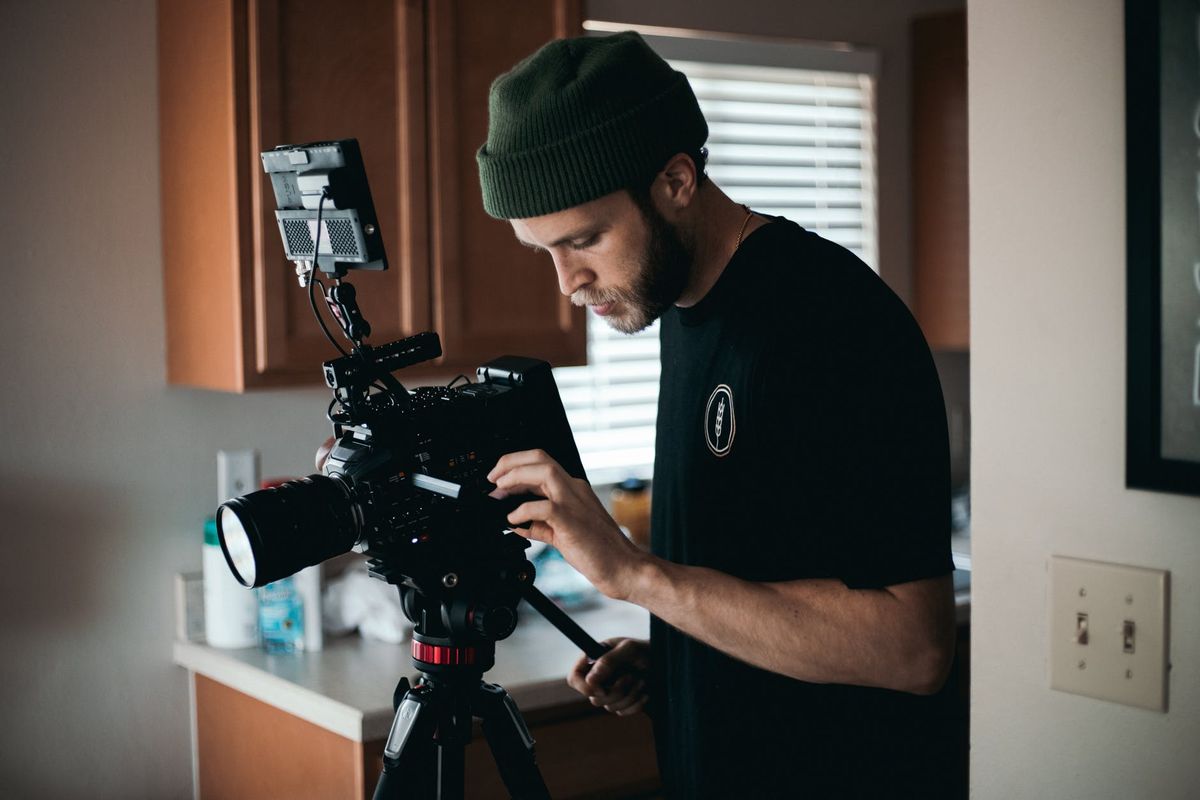Don’t miss these interesting documentaries that make you think

A few minutes every morning is all you need.
Stay up to date on the world's Headlines and Human Stories. It's fun, it's factual, it's fluff-free.
As a film genre, documentaries have gotten something of a bad wrap. It’s true that many of them are boring. The secret, though, is to watch documentaries that make you think and share information and stories on subjects you’re interested in. Plus, not all docs follow the same structure or use the same editing, directing or writing techniques. They can actually be quite avant-garde, experimental and fun when given your attention. After all, truth is multifaceted, and there are many ways of portraying the same story from different angles in order to create a singular work.
TMS spoke with Stephanie Khoury, who currently works in New Jersey as a documentary editor and producer and has a degree from Ithaca College in Documentary Studies and Production. Khoury is inspired by the courageous vulnerability of the people who let her into their lives, and she now spends her time collecting and collaging moments into films. We asked her a few questions about the cultural impact that documentaries can have.
“[Documentaries] can bring you into the worlds, spaces, lives and environments of people or spaces you wouldn’t normally have access to, but most importantly they can start the conversation by offering different perspectives,” Khoury explains. “I got involved with documentaries because I was always curious. The idea of choosing one thing to study for the rest of my life felt daunting, because there was so much to learn about the world.
“I think that’s what’s beautiful about documentaries, too, because they have so much room to explore people, experiences, subjects, themes, cultures – anything really – and at the core is storytelling. As an editor, I carry that innate curiosity from my childhood into the films I work on. My hope is that by the time someone finished watching a documentary that I worked on, they begin to ask questions, engage in discussions or leave with more empathy than they came in with.”
She also loves how creatively engaging documentaries can tell true stories. “Another thing I love about documentaries is the variety of subgenres there are and how creative you can be. You can either make an entirely essay-driven film where you have interviews, experts, research, that build a commentary usually around a thesis, or you can have character-driven films that also talk about historical or cultural milestones, but through personal experiences.”
On the subject of character-driven narratives, Khoury recommends “A Secret Love.”
“[It’s] about two women who kept their lesbian relationship a secret from family for seven decades. Though the film has several points where it dives into queer history, this story is mainly a portrait of life as these two women grapple with the realities of their old age and having to leave their home.
“Originally, I was drawn to the film through the visual treatment of the archival, but fell in love with the versatile scenes that would bring out the somber, serious, uplifting and hilarious moments that are representative of life.”
She also recommends watching “Crip Camp,” “The Brink,” and “Three Identical Strangers” as well as “Death Metal Grandma,” for which Khoury contributed as an editor.
If you’re looking to start watching more documentaries that make you think and that tell stories through compelling methodology, these are some top picks to add to your watch list.
“Time” (2020)
Starting out with a recent doc, “Time” is a poignant look into the American prison system and the treatment of Black Americans by the justice system. Shown in black and white, the starkness of the cinematography allows for a complex story of husband and wife to unfold without distraction, bringing attention to the shades of gray that exist within the current sociopolitical realities that surround race and incarceration. Produced and directed by Garrett Bradley, “Time” was nominated for best documentary feature at the 93rd Academy Awards.
“Stories We Tell” (2012)
Truly an exploration of how we choose to remember and the lies we tell ourselves and those close to us, “Stories We Tell” is a perplexing watch. Fact and fiction overlap in a compelling harmony throughout every minute of this doc.
Writer and director Sarah Polley uses documentary filmmaking here as an investigative tool into her late mother’s past and to piece together some of her more significant secrets that continue to affect her living family members. Using some more speculative methods (which we can’t reveal for fear of spoiling the entire movie), Polley is successful in questioning the conventions of typical documentary filmmaking, and, in doing so, questioning expressions of truthful storytelling.
“Spaceship Earth” (2019)
Certainly a strange story, “Spaceship Earth” is about a group of people who self-quarantined in a miniature model of Earth’s ecosystem (including desert and ocean sections) as an experiment for sustaining life on the moon and other planets. Eight people lived inside this model – called “Biosphere 2” – for two years, where they experienced personal drama as well as difficulty with the experiment itself. A watch suitable for curious minds, this movie is a fun expedition into what modern science is capable of (or what it was capable of in 1991).
“Hail Satan?” (2019)
Delving into the practices of The Satanic Temple, “Hail Satan?” is more a commentary on free speech and religious freedom in the United States than a look into satanic rituals. Through this documentary, you discover that The Satanic Temple isn’t interested in worshipping the devil at all; they just use satanic rhetoric to challenge religious fanaticism within the US. A fascinating and humorous look into the various shenanigans of this group, as well as genuine commentary on the separation of church and state, “Hail Satan?” is as amusing as it is pertinent.
“Hoop Dreams” (1994)
An absolute modern classic for a reason, “Hoop Dreams” is a documentary that has been hugely influential for the past 30 years since its release. Interesting for both sports fans and even those who can’t sit through a game on TV, “Hoop Dreams” is about two high school students who chase the goal of becoming professional basketball players.
It was filmed over the course of five years and has remained culturally significant, even deemed so by the Library of Congress. Not just a movie about basketball and teenagers, this film shines a light on the synergistic nature of the issues of class, race, educational access and traditional American social values.
“Dick Johnson Is Dead” (2020)
Similar to Polley’s “Stories We Tell,” “Dick Johnson Is Dead” explores the family stories of director Kirsten Johnson. As Johnson attempts to come to terms with the fact that her father is nearing the end of his life, the father-daughter duo work on staging various ways he could die, filming each of them. This is certainly an offbeat approach, but it brings some much-needed playfulness to the universal subjects of mortality, loss and grief.
“Hands on a Hardbody: The Documentary” (1997)
An eccentric film, “Hands on a Hardbody” is about an endurance competition that occurs in a small Texas town every year. The competition entails participants keep a hand on the outside of a truck until all but one remains standing there. A zoomed-in glimpse of cultural conventions of the American South, this doc is humble yet fascinating. For a less serious, but just as incredible watch, this should be your go-to.
“Feels Good Man” (2020)
Geared toward Gen Z, “Feels Good Man” is about meme culture. Specifically, it shows how Pepe the Frog has become a symbol of the Alt-Right, and the struggle of its creator, artist Matt Furie, to reclaim the image from this group. One of the few docs that really attempts to understand the politics of internet customs and the social currency of the information age, “Feels Good Man” is a compelling narrative, even if you don’t really know what a meme is.
“No Crying at the Dinner Table” (2019)
Directed by filmmaker Carol Nguyen, “No Crying at the Dinner Table” examines how emotional vulnerability is treated within Asian family units. As an Asian-Canadian, Nguyen uses her own family in order to delve into this intimate subject matter. Nguyen first interviews various family members on film, then plays those interviews at the family dinner table for them to watch. The structure of this documentary is unusual, but it only makes the film itself more thought-provoking and substantive.
“Casting JonBenét” (2017)
The tragic and bizarre circumstances of JonBenét Ramsey’s unsolved murder are, at this point, widespread. So another documentary about it could come across as insincere and redundant. A documentary about how individuals continue to perceive and regard such a puzzling cultural phenomenon, though? That’s an entirely new angle.
More about the cultural impact of how the JonBenét case unfolded and continues to live on, “Casting JonBenét” includes a series of interviews with average Americans who believe they are auditioning to play various people from this case in a movie about it. It ends on such a visceral note that you’ll be left completely dumbfounded.
Have a tip or story? Get in touch with our reporters at tips@themilsource.com




Comments ()